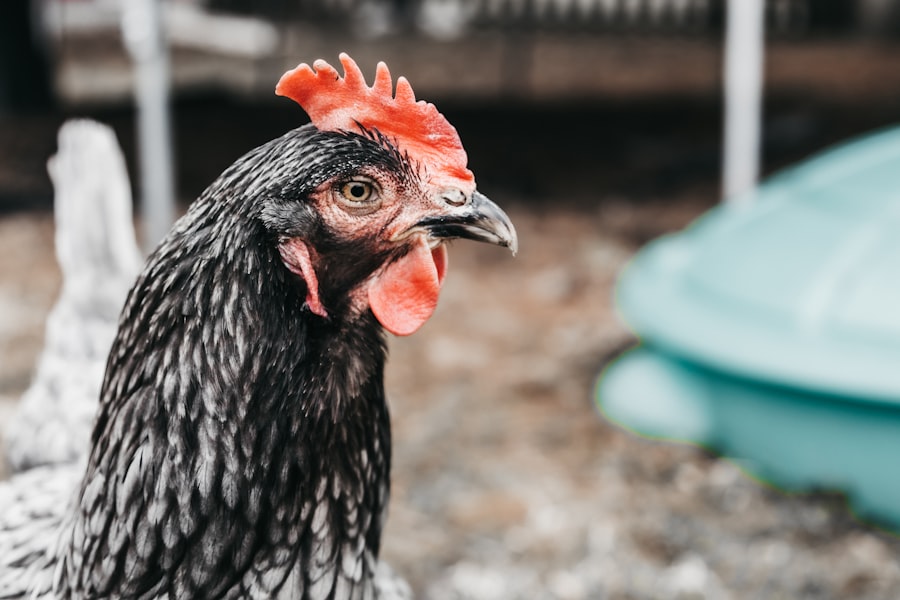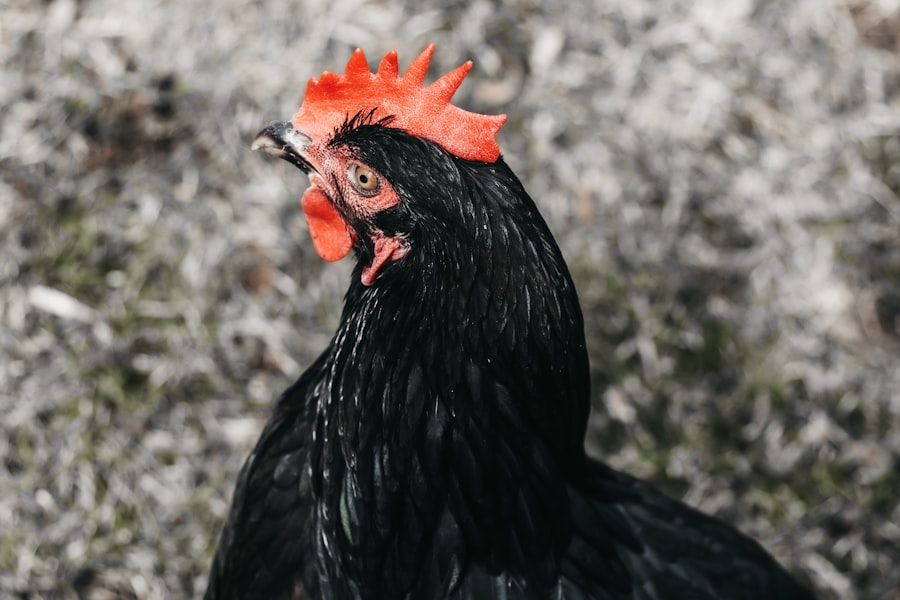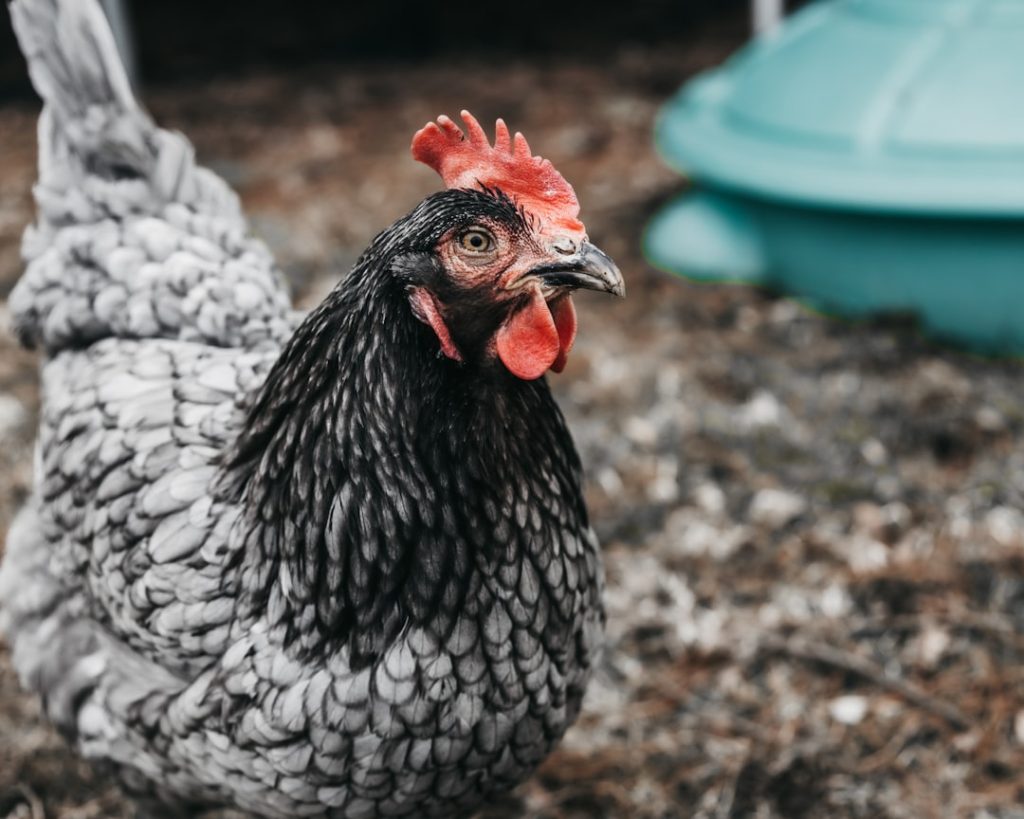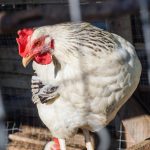Chickens are social animals that thrive in a flock environment. They have a natural pecking order, with dominant and submissive individuals. Understanding this behavior is crucial for maintaining a harmonious flock.
It’s important to provide enough space for chickens to establish their hierarchy without overcrowding, which can lead to aggression and stress. Additionally, chickens are curious and intelligent animals that require mental stimulation. Providing enrichment activities such as hanging treats, dust bathing areas, and perches can help keep them engaged and prevent boredom-related behavior issues.
Chickens also have natural instincts for foraging and scratching. They enjoy exploring their surroundings and searching for food. Providing opportunities for free-range or supervised outdoor time can satisfy these instincts and contribute to their overall well-being.
It’s important to observe and understand the body language of chickens to identify signs of stress, illness, or aggression. This can help prevent conflicts within the flock and ensure the overall health and happiness of the chickens. Chickens are also sensitive to changes in their environment and routine.
Sudden loud noises, unfamiliar objects, or disruptions in their daily schedule can cause stress and anxiety. It’s important to introduce new elements gradually and provide a calm and predictable environment for the chickens. Understanding the behavior of chickens is essential for creating a nurturing and supportive environment that meets their physical, social, and psychological needs.
Table of Contents
- 1 Providing Proper Nutrition for Chickens
- 2 Maintaining Clean and Comfortable Living Conditions
- 3 Regular Health Check-ups and Vaccinations
- 4 Ensuring Adequate Exercise and Mental Stimulation
- 5 Protecting Chickens from Predators and Environmental Hazards
- 6 Monitoring Egg Production and Collecting Eggs Promptly
- 7 FAQs
- 7.1 What are some common methods for keeping up with chickens?
- 7.2 How can we ensure that chickens are properly housed?
- 7.3 What should we feed chickens to keep up with their nutritional needs?
- 7.4 Why is it important to provide chickens with clean water?
- 7.5 How can we monitor the health and behavior of chickens?
Key Takeaways
- Chickens are social animals and exhibit a pecking order within their flock, so it’s important to understand their behavior and provide appropriate living conditions.
- Proper nutrition for chickens includes a balanced diet of grains, protein, vitamins, and minerals to support their health and egg production.
- Clean and comfortable living conditions are essential for chickens to thrive, including access to fresh water, proper ventilation, and a clean coop.
- Regular health check-ups and vaccinations are crucial for preventing diseases and ensuring the overall well-being of chickens.
- Chickens need adequate exercise and mental stimulation to prevent boredom and maintain their physical and mental health.
Providing Proper Nutrition for Chickens
Choosing the Right Feed
It’s important to choose a feed appropriate for the age and purpose of the chickens, whether they are laying hens, broilers, or chicks. In addition to commercial feed, chickens benefit from access to fresh water, grit, and supplemental treats. Grit helps chickens grind their food in their gizzards, aiding in digestion.
Supplementing with Treats and Foraging
Treats such as fruits, vegetables, mealworms, or kitchen scraps can provide variety and additional nutrients. However, it’s important to offer treats in moderation to avoid nutritional imbalances or obesity. Foraging is a natural behavior for chickens, and providing opportunities for free-range or supervised outdoor time allows them to supplement their diet with insects, seeds, and vegetation.
Monitoring and Adjusting Nutrition
This contributes to their overall health and happiness. It’s important to monitor the body condition of the chickens to ensure they are receiving adequate nutrition. Adjustments to their diet may be necessary based on factors such as age, season, or production goals. Providing proper nutrition for chickens is essential for supporting their growth, egg production, and overall health.
Maintaining Clean and Comfortable Living Conditions

Clean and comfortable living conditions are essential for the health and well-being of chickens. A clean coop helps prevent the spread of diseases and parasites, reduces stress, and promotes overall hygiene. Regular cleaning of the coop, nesting boxes, and roosting areas is necessary to remove droppings, soiled bedding, and debris.
This helps maintain good air quality and reduces the risk of respiratory issues. Proper ventilation is also important for regulating temperature, humidity, and air circulation within the coop. Adequate ventilation helps prevent moisture buildup, ammonia odors, and heat stress during hot weather.
It’s important to provide enough space for the chickens to move around comfortably and avoid overcrowding. Overcrowding can lead to stress, aggression, and an increased risk of disease transmission. Comfortable bedding such as straw, wood shavings, or shredded paper provides insulation, cushioning, and a clean surface for the chickens to rest on.
Regularly replacing soiled bedding helps maintain cleanliness and comfort within the coop. Additionally, providing access to dust bathing areas allows chickens to engage in natural behaviors that help keep their feathers clean and free of parasites. Maintaining clean and comfortable living conditions is essential for promoting the health, comfort, and productivity of chickens.
It’s important to establish a regular cleaning routine and monitor the condition of the coop to ensure a safe and hygienic environment for the chickens.
Regular Health Check-ups and Vaccinations
Regular health check-ups and vaccinations are essential for preventing diseases and maintaining the overall health of chickens. Establishing a relationship with a veterinarian who specializes in poultry can provide valuable guidance on preventive care, disease management, and treatment options. Regular physical examinations allow for early detection of health issues such as respiratory infections, parasites, or reproductive disorders.
Vaccinations are an important aspect of preventive care for chickens. Vaccines help protect against common diseases such as Marek’s disease, Newcastle disease, infectious bronchitis, and fowl pox. Following a vaccination schedule recommended by a veterinarian can help safeguard the flock from potentially devastating illnesses.
In addition to vaccinations, preventive measures such as parasite control, biosecurity protocols, and proper nutrition contribute to the overall health and disease resistance of chickens. Monitoring the behavior, appetite, egg production, and droppings of the chickens can provide valuable insights into their health status. Early intervention in case of illness or injury can help prevent the spread of diseases within the flock and improve the chances of recovery.
Regular health check-ups and vaccinations are essential components of responsible poultry care. By prioritizing preventive measures and seeking professional guidance when needed, chicken owners can help ensure the health and well-being of their flock.
Ensuring Adequate Exercise and Mental Stimulation
Adequate exercise and mental stimulation are important for the physical and psychological well-being of chickens. Providing opportunities for free-range or supervised outdoor time allows chickens to engage in natural behaviors such as foraging, scratching, dust bathing, and exploring their surroundings. This contributes to their overall fitness, muscle development, and agility.
In addition to physical exercise, mental stimulation is essential for preventing boredom-related behavior issues such as feather picking or aggression. Enrichment activities such as hanging treats, puzzle feeders, perches, or novel objects can help keep chickens engaged and mentally stimulated. Providing a variety of textures, sounds, and challenges within their environment can help satisfy their curiosity and intelligence.
Chickens also benefit from social interaction within their flock. Observing natural behaviors such as grooming each other, establishing pecking order, or communicating through vocalizations provides insight into their social dynamics. It’s important to provide enough space for chickens to establish their hierarchy without overcrowding or competition for resources.
Ensuring adequate exercise and mental stimulation contributes to the overall health and happiness of chickens. By providing a stimulating environment that supports their natural behaviors, chicken owners can help promote physical fitness, mental acuity, and social well-being within the flock.
Protecting Chickens from Predators and Environmental Hazards

Safeguarding Against Predators
Common predators such as foxes, raccoons, hawks, dogs, or snakes pose a significant threat to free-ranging or unsecured flocks. To deter predators, it is essential to install secure fencing, predator-proof coops, locks on doors and windows, or use motion-activated lights or sound deterrents.
Protecting from Environmental Hazards
In addition to predators, environmental hazards such as extreme weather conditions, toxic plants, or unsafe structures can pose significant risks to chickens. Providing adequate shelter from rain, wind, heat, or cold helps protect them from weather-related stress or illness. Regularly inspecting the surroundings for potential hazards such as sharp objects, toxic substances, or unsafe perches can help prevent accidents or injuries.
Proactive Safety Measures
It’s essential to be proactive in identifying potential risks and implementing measures to safeguard the chickens from harm. Monitoring the surroundings for signs of predator activity or environmental hazards allows for timely intervention to protect the flock. By prioritizing safety measures and being vigilant in protecting chickens from potential threats, owners can help ensure their well-being.
Monitoring Egg Production and Collecting Eggs Promptly
Monitoring egg production is an important aspect of managing a laying flock. Keeping track of daily egg production allows owners to identify changes in laying patterns that may indicate health issues or environmental stressors. Factors such as age, breed, nutrition, lighting conditions, temperature fluctuations, or disease can affect egg production.
Collecting eggs promptly helps prevent them from being pecked at or soiled by other chickens. It also reduces the risk of eggs being damaged or broken within the nesting boxes. Providing clean nesting material such as straw or wood shavings helps maintain hygiene within the nesting boxes and encourages hens to lay eggs in a suitable environment.
Regularly inspecting eggs for abnormalities such as cracks, shell quality issues, abnormal shapes or sizes can provide insights into the health status of the hens. Abnormalities in egg production may indicate nutritional deficiencies, stress-related issues, reproductive disorders or diseases that require attention. Monitoring egg production and collecting eggs promptly contributes to maintaining hygiene within the coop and ensuring the quality of eggs for consumption or sale.
By staying attentive to changes in laying patterns and addressing potential issues promptly, owners can help support the productivity and well-being of their laying flock.
If you’re interested in learning more about keeping chickens, you might want to check out this article on creating a garden chicken coop. It provides helpful tips and advice on how to set up a safe and comfortable living space for your feathered friends.
FAQs
What are some common methods for keeping up with chickens?
Some common methods for keeping up with chickens include providing proper housing, feeding them a balanced diet, ensuring they have access to clean water, and regularly monitoring their health and behavior.
How can we ensure that chickens are properly housed?
Chickens should be provided with a secure and well-ventilated coop that protects them from predators and extreme weather conditions. The coop should also have nesting boxes for laying eggs and perches for roosting.
What should we feed chickens to keep up with their nutritional needs?
Chickens require a balanced diet that includes a combination of commercial poultry feed, grains, fruits, vegetables, and access to insects and other protein sources. It’s important to provide them with the appropriate nutrients to support their overall health and egg production.
Why is it important to provide chickens with clean water?
Clean water is essential for chickens to stay hydrated and maintain their overall health. It’s important to regularly clean and refill their water containers to prevent the spread of diseases and ensure they have access to fresh water at all times.
How can we monitor the health and behavior of chickens?
Monitoring the health and behavior of chickens involves regularly observing them for any signs of illness, injury, or abnormal behavior. It’s important to be familiar with common poultry diseases and to seek veterinary care if any concerns arise. Additionally, maintaining a clean and sanitary environment can help prevent health issues in chickens.
Meet Walter, the feathered-friend fanatic of Florida! Nestled in the sunshine state, Walter struts through life with his feathered companions, clucking his way to happiness. With a coop that’s fancier than a five-star hotel, he’s the Don Juan of the chicken world. When he’s not teaching his hens to do the cha-cha, you’ll find him in a heated debate with his prized rooster, Sir Clucks-a-Lot. Walter’s poultry passion is no yolk; he’s the sunny-side-up guy you never knew you needed in your flock of friends!







